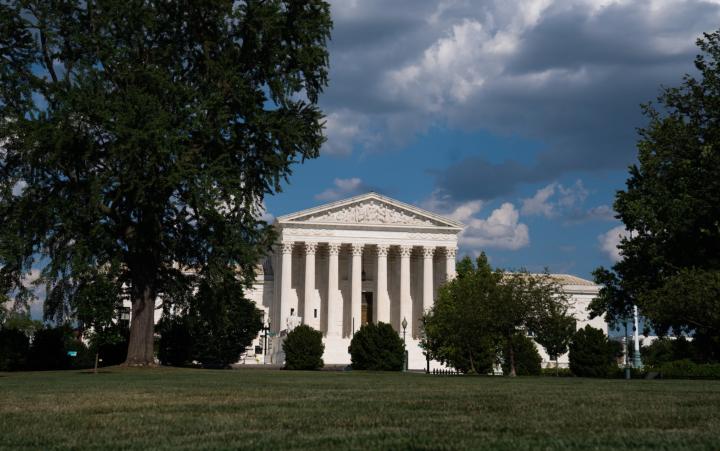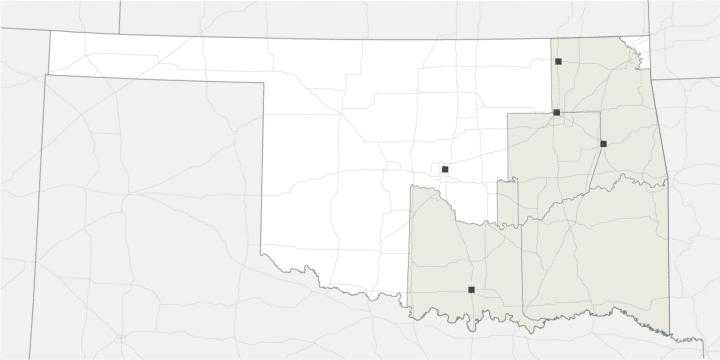 |
Canku Ota
|
 |
|
(Many Paths)
|
||
|
An Online Newsletter
Celebrating Native America
|
||
|
July 2020 - Volume 18
Number 7
|
||
|
|
||
|
Landmark Supreme
Court Ruling Affirms Native American Rights In Oklahoma
|
||
|
by Jack Healy and Adam
Liptak - New York Times
|
||
|
A 5-4 decision
declaring that much of eastern Oklahoma is an Indian reservation
could reshape criminal justice in the area by preventing state authorities
from prosecuting Native Americans.
The Supreme Court on Thursday ruled that much of eastern Oklahoma falls within an Indian reservation, a decision that could reshape the criminal justice system by preventing state authorities from prosecuting offenses there that involve Native Americans. The 5-to-4 decision, potentially one of the most consequential legal victories for Native Americans in decades, could have far-reaching implications for the people who live across what the court affirmed was Indian Country. The lands include much of Tulsa, Oklahoma's second-biggest city. The case was steeped in the United States government's long history of brutal removals and broken treaties with Indigenous tribes, and grappled with whether lands of the Muscogee (Creek) Nation had remained a reservation after Oklahoma became a state. A New Map of Oklahoma The Supreme Court on Thursday ruled that much of eastern Oklahoma falls within an Indian reservation. KAN
TEXAS
Ardmore
Choctaw
Nation Muskogee The decision puts in doubt hundreds of state convictions of Native Americans and could change the handling of prosecutions across a vast swath of the state. Lawyers were also examining whether it had broader implications for taxing, zoning and other government functions. But many of the specific impacts will be determined by negotiations between state and federal authorities and five Native American tribes in Oklahoma. Justice Neil M. Gorsuch, a Westerner who has sided with tribes in previous cases and joined the court's more liberal members to form the majority, said that Congress had granted the Creek a reservation, and that the United States needed to abide by its promises. "Today we are asked whether the land these treaties promised remains an Indian reservation for purposes of federal criminal law," Justice Gorsuch wrote in the majority opinion. "Because Congress has not said otherwise, we hold the government to its word." How the court ruled In McGirt v. Oklahoma, the court ruled, 5 to 4, that much of eastern Oklahoma is an Indian reservation.
Muscogee leaders hailed the decision as a hard-fought victory that clarified the status of their lands. The tribe said it would work with state and federal law enforcement authorities to coordinate public safety within the reservation. "This is a historic day," Principal Chief David Hill said in an interview. "This is amazing. It's never too late to make things right." The ruling comes at an extraordinary time for Native Americans. They are being ravaged by the coronavirus both in the soaring numbers of cases and deaths and the economic distress caused by closed casinos. But at the same moment, the nationwide movement to confront systemic racism has infused new energy and attention to generations-long fights by tribal nations and Indigenous activists over land, treaty rights and discrimination. In the past few weeks, tribal activists garnered international attention after they blocked the roads outside Mount Rushmore to condemn President Trump's visit to what they called stolen lands. They won a fight to shut down an oil pipeline that crossed sacred ground in North Dakota. In the face of growing pressure from corporate sponsors, the Washington Redskins of the N.F.L. recently promised to re-evaluate their team name, which activists have denounced for years as racist. On social media, people celebrated Thursday's decision with the declaration Native Lives Matter. "This brings these issues into public consciousness a little bit more," said John Echohawk, executive director of the Native American Rights Fund, a nonprofit organization that has spent five decades fighting for issues like tribal sovereignty and recognition. "That's one of the biggest problems we have, is that most people don't know very much about us." The court's decision means that Indigenous people who commit crimes on the eastern Oklahoma reservation, which includes much of Tulsa, cannot be prosecuted by state or local law enforcement, and must instead face justice in tribal or federal courts. Chief Justice John G. Roberts Jr. warned in a dissenting opinion that the court's decision would wreak havoc and confusion on Oklahoma's criminal justice system. "The state's ability to prosecute serious crimes will be hobbled and decades of past convictions could well be thrown out," Chief Justice Roberts wrote. "On top of that, the court has profoundly destabilized the governance of eastern Oklahoma." |
||||||||||||||||||||||||||||
|
|
||
|
|
||
| Canku Ota is a free Newsletter celebrating Native America, its traditions and accomplishments . We do not provide subscriber or visitor names to anyone. Some articles presented in Canku Ota may contain copyright material. We have received appropriate permissions for republishing any articles. Material appearing here is distributed without profit or monetary gain to those who have expressed an interest. This is in accordance with Title 17 U.S.C. Section 107. | ||
|
Canku Ota is a copyright ©
2000 - 2020 of Vicki Williams Barry and Paul Barry.
|
||
 |
 |
|
|
The "Canku
Ota - A Newsletter Celebrating Native America" web site and
its design is the
|
||
|
Copyright ©
1999 - 2020 of Paul C. Barry.
|
||
|
All Rights Reserved.
|
||










